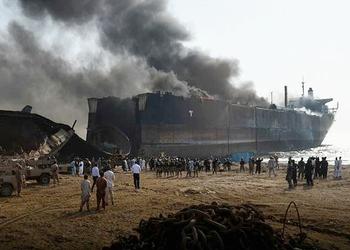
KARACHI, Pakistan, November 2, 2016 (ENS) – At least 21 shipbreaking workers died Tuesday and many more are injured and missing after gas cylinders exploded onboard an oil production tanker beached for scrapping at Gadani, on the Arabian Sea.
More than 60 workers are reported injured. Officials fear the death toll will rise as many of the injured workers are in critical condition with severe burns.

Missing workers reportedly remain stuck in the ship, where 24 hours after the blast, the fire is still blazing. The fire has reportedly spread to the ship’s engine room where fuel and gas cylinders are located.
“It could take another 48 hours to control the fire, as the tanker still has a significant quantity of oil present in the ship,” Commissioner Kalat Hashim Gulzai told reporters.
Local firefighters supported by the Pakistan Navy and Coastguard are still battling the fire, Hashim said Wednesday.
The floating oil production tanker, ACES (IMO #8021830), was sold to the Gadani shipbreaker by Jakarta-based PT Sinar Mentari Prima. It was used in the Jabung Batanghari terminal owned by the Indonesian government company BPMIGAS and operated by PetroChina.
Hashim said the contractor for the tanker work has been arrested and all shipbreaking at the Gadani yard has been banned while safety standards are reviewed.
Located in Balochistan province, the coastal village of Gadani, 50 kilometers (30 miles) northwest of Karachi, is the site of the world’s third largest shipbreaking yard.
The Pakistan National Trade Union Federation, NTUF, has announced three days of mourning and a strike at all the country’s shipbreaking yards.
Workers rallied in Gadani Wednesday, protesting the dangerous working conditions and lack of government support to enforce safety and occupational health laws.
Demanding their right to health and safety, the NTUF held a demonstration in Karachi Sunday, October 30. They called upon the Pakistan and Balochistan governments to address the many breaches of international workers’ rights that endanger shipbreaking workers in Gadani.
“This terrific accident is a painful reminder of the dangerous working conditions at the shipbreaking yards in Gadani. Our thoughts go first and foremost to the victims, to their families and friends,” said Ingvild Jenssen, policy director of the NGO Shipbreaking Platform, based in Brussels, Belgium.
The NGO Shipbreaking Platform is a coalition of 19 environmental, human rights and labor rights organizations working to prevent the pollution and unsafe working conditions created when end-of-life ships containing toxic materials in their structures are traded, beached and broken up for scrap.
The Platform joins NTUF’s demand that all victims of the oil tanker explosion must receive adequate treatment for their injuries and that they, or their relatives, must receive financial compensation for their losses.

Abid Qaiyum Suleri, executive director of the Sustainable Development Policy Institute, a Pakistani Platform member organization said Wednesday, “Health and safety must come first. This terrible blast could have been avoided. There is a clear lack of infrastructure and equipment in Gadani to prevent such a deadly accident.”
“Rescue operations are extremely difficult due to the lack of ambulances and firefighting equipment and because rapid access to the ship and the workers that are still stuck inside is extremely challenging,” Suleri said.
The NGO Shipbreaking Platform is calling for the closure of the Gadani beaching yards and for a move of the industry off the beach to areas that are under strict control, using alternative and safer methods in docks or along piers.
This year, the NGO Shipbreaking Platform has documented an increasing number of vessels related to the oil industry arriving for demolition on the beaches of South Asia as well as in Turkey and China.
The Platform is calling on the large oil and gas companies to ensure that their business partners – companies specialized in drill ships, companies leasing oil platforms, as well as tanker companies – commit to clean and safe recycling off the beach.
Copyright Environment News Service (ENS) 2016. All rights reserved.
© 2016, Environment News Service. All rights reserved. Content may be quoted only with proper attribution and a direct link to the original article. Full reproduction is prohibited.
